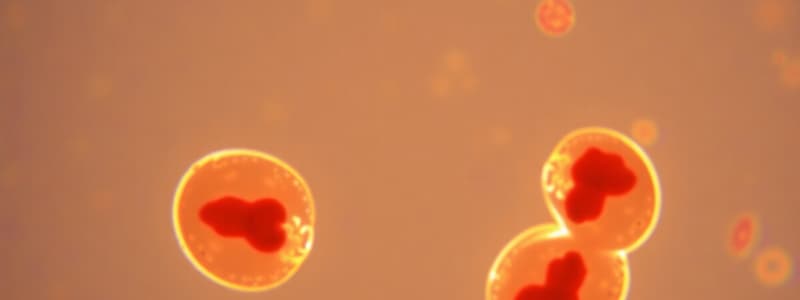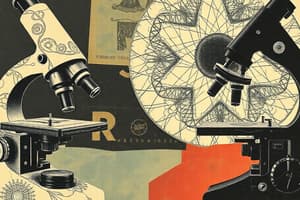Podcast
Questions and Answers
What is the primary purpose of mitosis in cells?
What is the primary purpose of mitosis in cells?
- Generating two identical daughter cells for growth and repair (correct)
- Facilitating waste removal in multicellular organisms
- Producing gametes for sexual reproduction
- Creating genetically diverse offspring
What distinguishes eukaryotic cells from prokaryotic cells?
What distinguishes eukaryotic cells from prokaryotic cells?
- Eukaryotic cells have smaller sizes compared to prokaryotic cells
- Eukaryotic cells contain a nucleus and membrane-bound organelles (correct)
- Eukaryotic cells are unicellular, while prokaryotic cells are multicellular
- Eukaryotic cells reproduce only through mitosis
Which of the following processes allows for genetic diversity in organisms?
Which of the following processes allows for genetic diversity in organisms?
- Meiosis (correct)
- Mitosis
- Protein synthesis
- Homeostasis
Which function is NOT performed by cells?
Which function is NOT performed by cells?
Why are cells considered the smallest functional units of life?
Why are cells considered the smallest functional units of life?
What discovery did Robert Hooke make when examining cork under the microscope?
What discovery did Robert Hooke make when examining cork under the microscope?
Which two scientists are credited with developing the early ideas of cell theory?
Which two scientists are credited with developing the early ideas of cell theory?
What is the primary function of a microscope?
What is the primary function of a microscope?
What significant advancement did Anton van Leeuwenhoek achieve with his microscope?
What significant advancement did Anton van Leeuwenhoek achieve with his microscope?
What did the term 'LENS' originate from, according to the historical context provided?
What did the term 'LENS' originate from, according to the historical context provided?
Flashcards are hidden until you start studying
Study Notes
Cell Division & Function
- Mitosis is the process of cell division that produces two identical daughter cells from a single parent cell.
- The primary purpose of mitosis is for growth and repair of tissues in multicellular organisms.
Eukaryotic vs. Prokaryotic Cells
- Eukaryotic cells have a membrane-bound nucleus that contains their genetic material (DNA).
- Prokaryotic cells lack a nucleus and their DNA is located in a region called the nucleoid.
Genetic Diversity
- Meiosis, the process of cell division that produces gametes (sex cells), is responsible for genetic diversity in organisms.
- Meiosis introduces genetic variation through the processes of crossing over and independent assortment of chromosomes.
Cell Functions
-
Cells perform a wide range of functions, including:
- Metabolism: the chemical processes that sustain life
- Growth: increasing in size and complexity
- Reproduction: producing new cells
- Response to stimuli: reacting to changes in their environment
- Homeostasis: maintaining a stable internal environment
-
The only function NOT performed by cells is conscious thought.
Cells as the Basic Unit of Life
- Cells are considered the smallest functional units of life because they are the smallest units that can perform all the necessary functions for life.
Robert Hooke's Discovery
- When examining cork under a microscope, Robert Hooke observed small, box-like compartments that he named "cells" due to their resemblance to the cells of a monastery.
Cell Theory Pioneers
- Robert Hooke and Anton van Leeuwenhoek are credited with laying the groundwork for the cell theory, which states that all living organisms are composed of cells.
The Power of the Microscope
- The primary function of a microscope is to magnify small objects, making them visible to the human eye.
Anton van Leeuwenhoek's Achievement
- Anton van Leeuwenhoek improved on existing microscope designs, creating a superior lens that allowed him to observe microscopic organisms like bacteria and single-celled creatures.
The Lens: A Historical Context
- The term "lens" is believed to have originated from the Latin word "lentil," referring to the lentil seed, which is often lens-shaped.
- In the context of magnifying tools, the term "lens" refers to a piece of transparent material that refracts light, allowing for magnification.
Studying That Suits You
Use AI to generate personalized quizzes and flashcards to suit your learning preferences.




